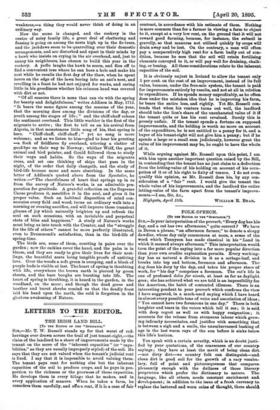LETTERS TO THE EDITOR.
THE IRISH LAND BILL.
[To THE EDITOR OP TRH "SPECTATOR."
SIR,—Mr. T. W. Russell stands up for that worst of red- herrings ever drawn across the trail of just tenant-right,—the claim of the landlord to a share of improvements made by the tenant on the score of the " inherent capacities " (or " capa- bilities," as they are usually improperly styled) of the soil. He says that they are not valued when the tenant's judicial rent is fixed. I say that it is impossible to avoid valuing them. The tenant pays rent for nothing else but the inherent capacities of the soil to produce crops, and he pays in pro- portion to the richness or the poorness of those capacities. He develops them in every tillage that he makes, and in every application of manure. When he takes a farm, he considers them carefully, and offers rent, if it is a case of fair
contract, in accordance with his estimate of them. Nothing is more common than for a farmer in viewing a farm to object to it, except at a very low rent, on the ground that it will not reward good farming, because, for instance, the subsoil is gravelly, so that manures not utilised quickly by crops will drain away and be lost. On the contrary, a man will often, pay a comparatively high rent for a farm badly out of con- dition, because he sees that the soil will retain fertilising elements conveyed to it, or will pay well for draining, chalk- ing, or boning. All these considerations relate to the inherent. capacities of the soil.
It is obviously unjust in Ireland to allow the tenant only 5 per cent. on the cost of an improvement, instead of its full value, because, under the free-sale system, the tenant is paid for improvements entirely by results, and not at all in relation to expenditure. If he spends money unprofitably, as he often. does under the mistaken idea that he is improving his farm, he bears the entire loss, and rightly. Yet Mr. Russell con- tends that when his venture turns out well, the landlord should take the lion's share of the unexhausted value of it if the tenant quits or has his rent revalued. Surely this is grossly unfair. If the tenant spends a fortune on supposed. improvements, and the holding is worth no more on account. of the expenditure, he is not entitled to a penny for it, and w. buyer of his tenant-right will not give him a penny; but if he spends a large or a small sum judiciously, however great the value of his improvement may be, he ought to have the whole. of it.
While arguing against Mr. Russell upon this point, I am with him upon another important question raised by the Bill,. in contending that the tenant has no just claim to a deduction from the letting-value of his holding on account of his occu- pation of it or of his right to fixity of tenure. I do not even. qualify this opinion, as Mr. Russell does his, by any con- sideration of a "fair" rent. I would give the tenant the whole value of his improvements, and the landlord the entire letting-value of the farm apart from the tenant's improve- ments.—I am, Sir, &c.,


































 Previous page
Previous page